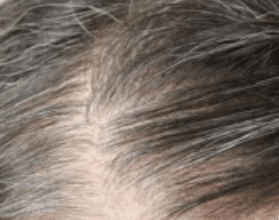A dialysis patient with hair loss is seen on dialysis rounds with hair loss post failed kidney transplant on tacrolimus. Why is she losing hair?
The patient 58-years-old and has been on dialysis for 6 months. Her prior transplant failed after 15 years. The initial cause of the end-stage kidney disease was hypertension.
The transplant team has stated they are planning to retransplant the patient in the future. Her thyroid function tests are normal.
Dialysis patient with hair loss
Status post failed transplant. What is the cause?

Please answer the following questions:
She is losing her hair because she is on dialysis. Women with hair loss related to dialysis, called telogen effluvium, can suddenly lose their hair and this can occur at any point during dialysis treatment, either when beginning kidney replacement therapy or later on. Telogen effluvium is characterized by widespread and noticeable hair shedding.
The immunosuppressant tacrolimus may be a contributing factor but would be less likely after 15 years on the medication without prior issues.
Telogen effluvium caused by tacrolimus usually occurs up to 14 months after starting tacrolimus and is felt to be caused by vasoconstriction.
We could consider switching to cyclosporin in this dialysis patient with hair loss, after giving the patient some time on dialysis and talking with the transplant team to confirm the best strategy moving forward (they plan to retransplant and tacrolimus may be the preferred immunosuppressive therapy of choice).
Learn More:
Assessing CAD In ESRD – Transplant Evaluation, Quiz With Solution by Michael Aaronson, Lincoln Nephrology and Hypertension
Treating Tenofovir Nephrotoxicity in HIV, Quiz With Solution by Michael Aaronson
Using The Number Needed To…
Best Way To Prevent Contrast…
Go to the Top


